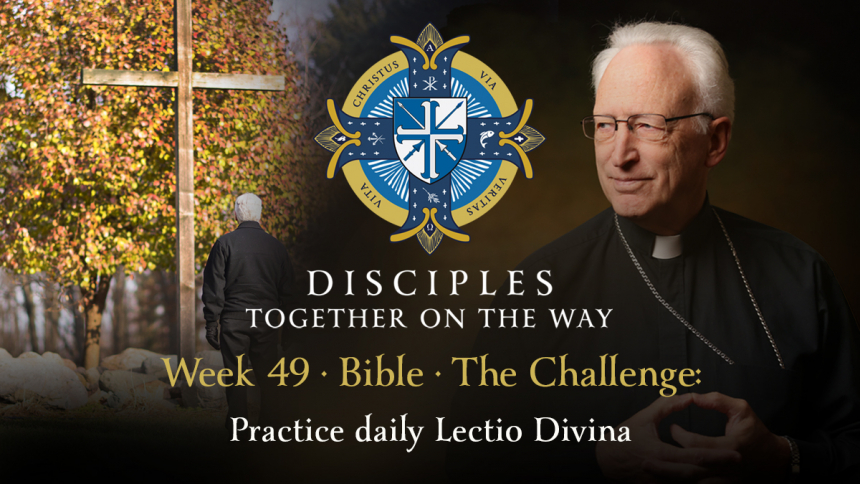
December 9, 2022
Dear Brothers and Sisters in Christ,
In the Gospel of Mark, we read how in the midst of the stormy waters, Jesus awoke and rebuked the wind and said to the sea, “Peace! Be still!” And the wind ceased, and there was a great calm…And [his disciples] were filled with great fear and said to one another, “Who then is this, that even the wind and the sea obey him?”1
The Word of God that calmed the wind and the sea is the same Word of God that raised Lazarus from the dead or, for that matter, called the universe into being out of nothing.
The Second Vatican Council's Dogmatic Constitution on Divine Revelation, Dei verbum, states that we hear this Word “in the sacred books, [where] the Father who is in heaven meets His children with great love and speaks with them” (DV 25).
When we hear the voice of God, our life can change. Yet, amidst all the noise of the world, how do we hear?
Over the centuries the Church has cultivated a discipline of listening to the Lord’s Voice that she calls, Lectio Divina or “Divine Reading.” While there are many approaches to Lectio Divina, I’ll walk you through a way of practicing this art of listening. Let’s start…with stopping.
Stop. Quiet yourself. An important conversation is about to happen — so, get ready to listen!
Next, take up a short passage from one of the Gospels, perhaps the one that the Church hears at daily Mass. This is the reading of the text – Lectio-Reading – Take it in. Receive what God has to say:
Read through it—once, twice, maybe three times. Ask yourself, what’s happening? What is Jesus saying? How do people respond? Think about it. Ponder.
Read it again. If you’ve read the Gospels at all, you know that Jesus’ presence provokes a response. Is there a word or phrase or aspect that pokes you?
Step II is meditation, meditating on what struck you. Just as when someone asks, “How are you?” and you implicitly ask yourself, “How am I?” What part of your heart did God poke? Take some time to ponder the word or phrase that struck you:
What does this word or phrase provoke in me? Why does that particular thing strike me? What feelings does this word or phrase provoke in me? What’s happening in my life right now that this word/phrase is standing out for me? Does it bother me? intrigue me? scare me? Why does it scare me? What about it scares me?2
Step III is Oratio, which means speaking to the Lord about what struck me:
This is the point in the conversation where I respond. Speak to the Lord about what His word or phrase provoked in me? As the Catholic philosopher, Peter Kreeft, puts it, someone else’s “words may be more beautiful, but…God wants your own words most of all because they are your own; they come from your heart....”3
Step IV is Contemplatio, contemplation – simply being with the Lord:
The aim of any conversation is mutual understanding, but the goal of this kind of prayerful conversation is communion. We heard the Lord’s Voice. We let His Word into our heart. We spoke our heart back to Him. And now we spend time dwelling in communion. The whole point of this time is to be with the Lord. That’s it.
Hence: This week’s challenge is to spend at least fifteen minutes each day praying the basic path of Lectio Divina that so many saints have trod. May God bless you all, in the name of the Father and of the Son and of the Holy Spirit.
Yours in Christ,
+ Earl Boyea
Bishop of Lansing
________________________________________
1 English Standard Version – Catholic Edition (Denver: The Augustine Institute, 2019), Mk 4:39–41.
2 Francis, Evangelii Gaudium, Apostolic Exhortation (Vatican City: Libreria Editrice Vaticana, 2013), no. 153.
3 Peter Kreeft, Prayer for Beginners (San Francisco: Ignatius Press, 2000), 30.
